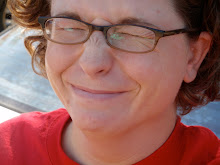It's funny how environment impacts our identities. I noticed this when I was backpacking Europe, the first few 'getting to know you' questions are very different than the typical arrangement. These three are generally the first questions you ask other travelers:
Where are you from?
Where have you been?
Where are you going?
There may be an age question, but nowhere on this list is, What do you do? Which, of course, is totally a sanctimonious question. I remember when I was in Germany, I hung out with a kid from Florida all day, but we never actually exchanged names. We went for a hike, had dinner and rode a train together, but in my head, he was ‘the American’ I hung out with. Similarly, my roommates became, ‘the Canadians,’ or where ever they were from.
It took me being in another country for me to realize I even had a national identity. It’s an identity that’s next to useless when I’m home, but when I’m abroad, it’s my first identifiable characteristic. I would never walk around Utah saying, ‘I’m American,’ let alone in the same prideful tone I tend to say it here. Apparently, my national identity is reserved for international travels only.
National identities at home tend to be surrounded with idealistic notions relating to the military, the south, war, religion and whatnot, so I tend to wear it tentatively when I’m around other Americans, but as a foreigner living abroad, it’s the first thing I say about myself.
Even though I’m American, I never EVER say I’m from America, I guess my national identity doesn’t extend that far. I will say the United States, or the States, or even the U.S., but never, ever America. That’s just a little too patriotic for me I guess. In my mind, there’s not much difference between announcing I’m from America to unveiling a tattoo of an eagle clutching old glory in its talons! Does that make me ‘less’ of an American? Hmmm... yeah, probably.
For the last 10 months and a few weeks, I’ve been slowly reading the book, ‘A People’s History of the United States’ by Howard Zinn. It’s not exactly a book you just read for hours, it’s a book that is best understood after ingesting a little at a time and weighing what I’ve read, which is a revised version of the history I have been continually exposed to. I really liked the way he describes the motivation from this historical account of the United States:
My viewpoint, in telling the history of the United States, is different: that we must not accept the memory of states as our own. Nations are not communities and never have been. The history of any country, presented as the history of a family, conceals fierce conflicts of interest (sometimes exploding, most often repressed) between conquerors and conquered, masters and slaves, capitalists and workers, dominators and dominated in race and sex.
This was the first time I thought about the concept of a national identity, and whether or not it exists. I can understand what Zinn proposes, that the sheer size of the United States and staggeringly different experiences the population encounters, makes it impossible to identify a national identity. That, in fact, people are more likely to experience a local identity that is often assumed to be national, when it’s not. But I don’t know if I agree with that because there are a lot of stories that give me the feeling of the Land of Opportunity. I can identify the difference between my local identity and my national identity. My love for the outdoors comes very much from living in Utah, but the inspiration Washington D.C. gives me comes from my national identity.
So the thing is, I only wear an identity as long as I need it. And this connection makes it impossible to ignore the relationship between identity and community. There have been points in my life where I’ve identified in a way that is completely at odds with how I identify today. That doesn’t mean I was wrong, or it never applied, for instances, my identity as a student is no longer pertinent in how I view myself, so I rarely use it to describe myself these days.
I’ve also noticed that it often takes a while for me to warm up to the idea of a new identity. For example, technically I am working in a job that requires both a higher education and specialized skills, but I am still reluctant to refer to myself as a working professional. Even though that most aptly describes my current situation, I have not yet owned that identity, regardless if it fits. I suppose the reason it takes a while to warm up to, for me at least, is because of what I said earlier, I’m not ready to be apart of the community that follows the identity. When I think of other ‘working professionals,’ they have a longer work history in their profession, maybe have an asset or three, and I don’t, so I’m not confident in being in the same community.
One undeniable lesson Korea has taught me is, identities are as brief as relationships. You think they’ll last the hardships of time, but they don’t. And there’s not much lost in that because, normally, there are new identities and new relationships to get distracted by. At least, that’s been my experience.

No comments:
Post a Comment